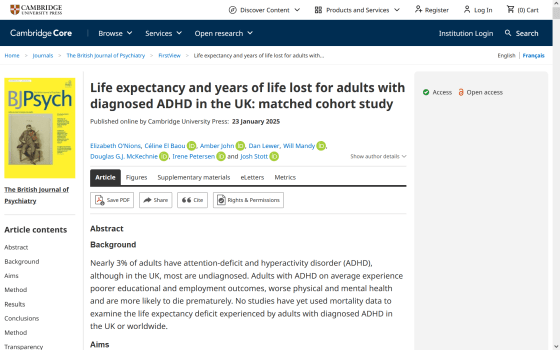People with ADHD have shorter life expectancies

Adults diagnosed with Attention Deficit Hyperactivity Disorder (ADHD) may live an average of 6.78 years less than their peers if they are men and 8.64 years less than their peers if they are women, a study has found.
Life expectancy and years of life lost for adults with diagnosed ADHD in the UK: matched cohort study | The British Journal of Psychiatry | Cambridge Core

Adults with ADHD found to have reduced life expectancy
Adults diagnosed with ADHD have shorter life expectancy, UK study shows | Attention deficit hyperactivity disorder | The Guardian
https://www.theguardian.com/society/2025/jan/23/adults-diagnosed-adhd-shorter-life-expectancy-attention-deficit-hyperactivity-disorder
Elizabeth Onions of the University of Cambridge and her colleagues analysed anonymised data from 30,029 British adults diagnosed with ADHD and compared it with data from 300,390 people without ADHD.
'Past research has suggested that people with ADHD have a shorter life expectancy, but this was not based on death records. This study is unique in that it collected data from primary care , where doctors provide comprehensive diagnoses while building an ongoing partnership with patients, and conducted a more detailed analysis.'
The study found that men who had been diagnosed with ADHD in the past had a significantly shorter life expectancy of 4.5 to 9 years, and women who had been diagnosed with ADHD had a significantly shorter life expectancy of 6.5 to 11 years. On average, this was 6.78 years shorter for men and 8.64 years shorter for women, making the difference between those with ADHD and those without clear.

According to Onions and his colleagues, this may be because people with ADHD are more likely to have mental health problems, have higher suicide rates, and are more likely to engage in risky behaviors such as smoking, drinking alcohol, and binge eating.
In addition, people with ADHD are more likely to experience daily events that they find stressful and a sense of being excluded from society, which can have a negative impact on their health and self-esteem. For example, a national survey of adults aged 16 to 64 in the UK found that one-third of people with ADHD traits received medication or counseling for mental health problems, while only 11% of people without ADHD received similar support.

People with ADHD have different ways of concentrating, and although they have the ability to concentrate on things that interest them, they have difficulty concentrating on uninteresting or mundane tasks. This leads to impulsivity, restlessness, lack of planning, and poor time management, making it difficult to succeed in school or work, and increasing the likelihood of long-term problems. Onions and others are calling for the need to provide appropriate care to such people.
This study found that about one in nine adults are diagnosed with ADHD. Despite this small number of people being diagnosed with ADHD, the treatment system in the UK is not as adequate as in other high-income countries. Onions pointed out, 'Many people with ADHD live long, healthy lives, but the finding that they live shorter lives on average shows that more support is needed. It is crucial to understand the reasons behind premature death in order to develop strategies to prevent it.'
Related Posts:
in Science, Posted by log1p_kr







